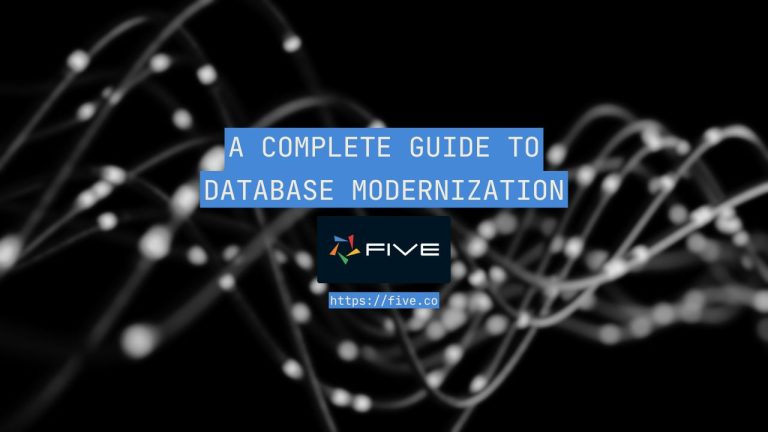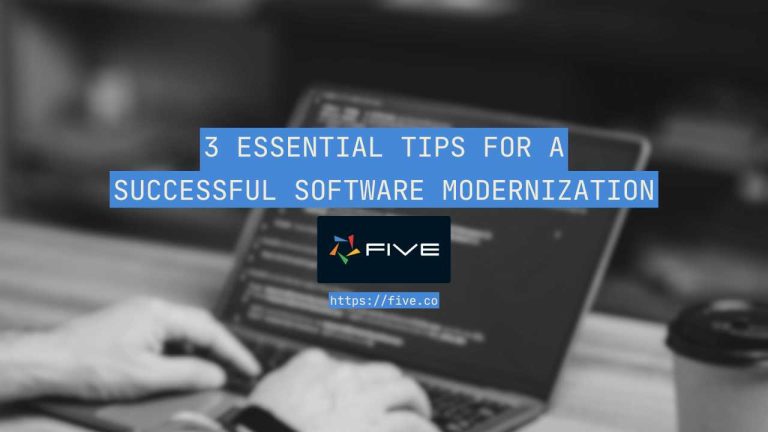HIPAA Database Compliance: Complete Guide
Navigating HIPAA compliance can feel like walking through a maze blindfolded. If you’re handling healthcare data, you’ve probably asked yourself: “Is my database really HIPAA compliant?” Don’t worry – you’re not alone in this journey, and we’re here to help you understand everything about HIPAA database compliance.
- Why HIPAA Database Compliance Matters
- The Costs of Non-Compliance Systems
- Essential Security Measures Your Database Needs
- Cloud Hosting for HIPAA Compliance
- What Are Your Options for HIPAA Compliance?
- Phase 1 of Creating Your HIPAA Database
- Phase 2 of Creating Your HIPAA Database
- Why Choose Five For Your HIPAA Database
- Extra HIPAA Database Information
Why HIPAA Database Compliance Matters
Healthcare data breaches are becoming more common and more expensive. Protecting patient information isn’t just about following rules – it’s about maintaining trust and protecting your organization’s future. Whether you’re running a small medical practice or managing a large healthcare system, understanding HIPAA database compliance is crucial.
HIPAA database compliance requires layered security measures working together to protect patient data. The regulations set clear standards for data protection while giving organizations freedom to choose their preferred technologies.
Rather than mandating specific database systems, HIPAA allows healthcare providers to implement solutions that match their needs – as long as they meet the required security standards. This practical approach lets organizations balance compliance requirements with their operational capabilities.
The Costs of Non-Compliance Systems
Many healthcare organizations underestimate the true cost of operating outdated or partially compliant database systems. Beyond the obvious risk of HIPAA violations, which can result in fines up to $1.5 million per year per violation, there are numerous hidden expenses that impact your bottom line.
Operational inefficiencies often manifest through:
- Staff spending extra hours on manual data validation
- Slower patient service due to system performance issues
- Higher maintenance costs for aging infrastructure
- Increased IT support requirements
- Lost business opportunities due to limited integration capabilities
When factoring in these costs, many organizations discover they’re spending more maintaining their current system than they would investing in a modern, fully compliant solution.
This reality, combined with the rising costs of data breaches in healthcare (averaging $10.1 million per incident), makes modernization not just a compliance requirement but a sound business decision.
Essential Security Measures Your Database Needs
Every person accessing your database needs their own unique ID – think of it like giving each employee their own key to the building. But it’s not enough to just hand out keys; you need to know who’s using them and when.
Here’s what you absolutely must have in place:
- Strong encryption for all patient data (both when it’s sitting in your database and when it’s being transmitted)
- Detailed access logs (keeping track of who accessed what and when)
- Regular backups (because losing patient data isn’t an option)
- Up-to-date software (those security patches are there for a reason)
Cloud Hosting for HIPAA Compliance
Cloud hosting has revolutionized how we handle healthcare data, but it comes with its own set of considerations. Here’s what you need to know: while cloud providers can offer HIPAA-compliant infrastructure, they’re not automatically HIPAA compliant out of the box.
So now we know about the importance of having a HIPAA database, where to from here…
What Are Your Options for HIPAA Compliance?
Many healthcare organizations find themselves at a crossroads – attempting to build compliance in-house, working with general IT consultants, or partnering with healthcare database specialists. At Five, our dedicated development team offers comprehensive database modernization services backed by years of compliance expertise.
While our advanced low-code platform accelerates development, it’s our team’s deep healthcare experience that truly sets us apart. Our specialists have helped medical institutions maintain secure, compliant database systems. We handle the technical complexity of HIPAA compliance, allowing you to focus on what matters most – patient care.
Five’s development team brings extensive healthcare experience to:
- Configure role-based access controls
- Implement encryption at rest and in transit
- Set up automated audit logging
- Create secure backup procedures
- Establish emergency access protocols
By combining expert consultation, custom development services, and ongoing support, we ensure your database system not only meets compliance standards but drives operational efficiency. Here’s how we make it happen…
Phase 1 of Creating Your HIPAA Database
When you partner with Five’s development team for your HIPAA database needs, our proven process ensures comprehensive compliance through a carefully structured approach.
Our methodology begins with thorough assessment and planning, where our database specialists evaluate your existing infrastructure.
This initial phase involves detailed mapping of your current data structures, identification of compliance gaps, and documentation of security requirements.
Our team develops strategic migration plans and creates realistic implementation timelines tailored to your organization’s needs.
Phase 2 of Creating Your HIPAA Database
Moving into the secure architecture design phase, Five’s experts use our powerful low-code platform to create your database architecture.
We focus on building robust encrypted data storage solutions and implementing sophisticated authentication systems.
Our design process includes creating comprehensive audit trail mechanisms, establishing reliable backup procedures, and designing thorough disaster recovery protocols to ensure business continuity.
During the implementation and testing phase, our experienced team manages all technical aspects of your database deployment. This includes setting up the core infrastructure, configuring advanced security controls, and implementing comprehensive monitoring systems. We conduct rigorous testing of all security measures and validate every compliance requirement to ensure complete HIPAA adherence.
Why Choose Five For Your HIPAA Database
To illustrate our expertise, we recently partnered with a multi-location medical practice to modernize their patient records system.
Our team successfully built a HIPAA-compliant database, securely migrated legacy data, implemented real-time access controls, established automated compliance monitoring, and provided comprehensive staff training. The result was a fully compliant system delivered fast, with zero security incidents during the transition.
Our approach combines the efficiency of low-code development with expert implementation, leading to significant benefits for our clients. Organizations experience reduced development time, lower implementation costs, and minimized compliance risks, all while achieving faster deployment times and receiving ongoing expert support.
Ready to modernize your healthcare database while ensuring HIPAA compliance? Our team is prepared to help you assess your current system, plan your modernization strategy, implement a secure solution, and maintain ongoing compliance. Contact Five’s healthcare database experts today to discuss your HIPAA compliance needs and discover how our low-code platform can accelerate your path to a modern, secure healthcare database system.
We invite you to book a risk-free consultation with our healthcare specialists. During this session, we’ll review your compliance requirements, explore our platform’s capabilities, discuss implementation options, and provide a customized solution proposal to start your modernization journey.
Don’t let database compliance challenges hold your healthcare organization back. Partner with Five’s experts to build a HIPAA-compliant database that supports your growth while protecting patient data.
Reach out to us today, and let’s build a system that works for you, not against you.
Extra HIPAA Database Information
Who Judges Compliance?
HIPAA compliance is primarily overseen by the U.S. Department of Health and Human Services (HHS), specifically through its Office for Civil Rights (OCR). The OCR is responsible for investigating complaints, performing audits, and taking enforcement actions when entities fail to comply with HIPAA regulations.
Other parties involved in HIPAA compliance include:
- Third-party Auditors: Organizations may hire external firms to assess their compliance.
- Internal Compliance Teams: Many organizations have dedicated compliance officers or teams to ensure adherence.
- Legal Authorities: In some cases, courts or other legal entities may assess HIPAA compliance during legal disputes.
Key Considerations for HIPAA Compliance
To ensure compliance with HIPAA, organizations must adhere to specific requirements laid out in the Privacy Rule, Security Rule, and Breach Notification Rule. Here are some major considerations:
Privacy Rule Compliance
- Protected Health Information (PHI): Ensure that all PHI, whether in electronic, written, or oral form, is kept confidential.
- Patient Rights: Provide patients with access to their records, the ability to request corrections, and detailed notices of privacy practices.
- Minimum Necessary Standard: Only disclose the minimum amount of PHI needed for a specific purpose.
Security Rule Compliance
- Administrative Safeguards:
- Conduct risk assessments to identify vulnerabilities.
- Implement security policies and workforce training.
- Physical Safeguards:
- Control physical access to systems containing PHI.
- Secure workstations and devices.
- Technical Safeguards:
- Use encryption and secure transmission methods for electronic PHI (ePHI).
- Implement access controls, audit logs, and authentication mechanisms.
Breach Notification Rule
- Notify affected individuals, HHS, and sometimes the media in the event of a PHI breach.
- Provide notifications promptly, typically within 60 days of discovering the breach.
Business Associate Agreements (BAAs)
- Ensure all third-party vendors who handle PHI sign BAAs acknowledging their compliance obligations.
Workforce Training
- Train all employees regularly on HIPAA policies, PHI handling, and recognizing potential breaches.
Documentation and Audits
- Maintain thorough records of compliance efforts, including risk assessments, training records, and incident responses.
- Be prepared for audits by having policies and procedures readily available.
Technology and Data Security
- Use secure systems for storing and transmitting PHI, such as encrypted email and secure cloud platforms.
- Regularly update software and conduct penetration testing to address vulnerabilities.


